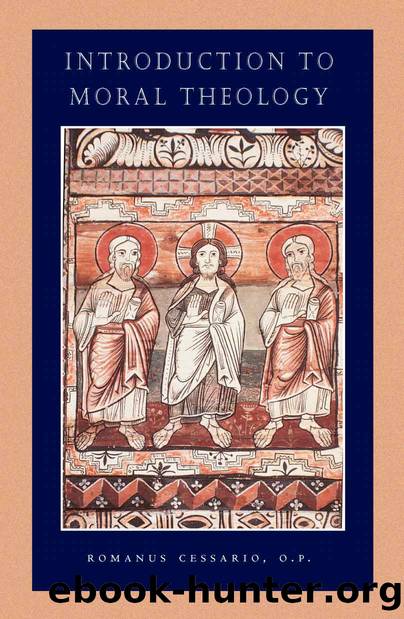Introduction to Moral Theology (Catholic Moral Thought, Volume 1) by Cessario Romanus

Author:Cessario, Romanus [Cessario, Romanus]
Language: eng
Format: epub
ISBN: 9780813220376
Publisher: Catholic University of America Press
Published: 2010-03-30T00:00:00+00:00
For we say that deliberating well is the function of the intelligent person more than anyone else; but no one deliberates about what cannot be otherwise, or about what lacks a goal that is a good achievable in action. The unconditionally good deliberator is the one whose aim expresses rational calculation in pursuit of the best good for a human being that is achievable in action.66
The Christian tradition recognizes that the philosopher's âbest goodâ is revealed to us as the summum bonum, the highest Good in an unqualified sense. Only God matches that description.
Since prudence always remains interested in the agibile, the doable, its concern must extend to individual cases.67 Aristotle's realism remains coolly confident about the ability of prudence to form sound practical judgments, but the Christian thinker must also recall the Book of Wisdom when it warns that âour counsels are uncertainâ (Wis 9:14).68 Christian practice then does not reproach the prudent man for failing in unforeseen and exceptional cases, but only when he fails in matters that fall under common experience. Still, prudence aims at regularity in sound moral judgment and practice.
It is on this basis, in fact, that prudence qualifies as a bona fide moral virtue, namely, that it charges a person's conduct with moral truth, so that the person actually embraces a concrete moral good.69 Having accepted Aristotle's definition, the Christian scholastics continued to speak about prudence as the right order of doing somethingârecta ratio agibilium.70 The rectitude or rightness of prudence rests on the authentic end of human existence.71 As a ratio, prudence constitutes a perfection of human intelligence; it consists in reasoning. Prudence possesses its own logical structure, which is ordered to consider proper relations among things involved in human conduct. At the same time, prudence develops a right order for doing; it is about practical intelligence in the order of action. Aquinas distinguishes prudence from art, but the metaphor of virtue as a craft helpfully expresses his notion of what prudence achieves.72 If we think of virtue as a craft, then prudence sees to it that the prudent person assembles a good life, in the same way that artistic talent ensures that an artisan crafts a worthy artifact.
Download
This site does not store any files on its server. We only index and link to content provided by other sites. Please contact the content providers to delete copyright contents if any and email us, we'll remove relevant links or contents immediately.
Christian Ethics by Wilkens Steve;(854)
Christian Ethics for a Digital Society by Kate Ott(778)
Fearfully and Wonderfully Made by Philip Yancey & Paul Brand(771)
God and the Multiverse by Victor J. Stenger(672)
Numbers by Ronald B. Allen(632)
How to Read Slowly by James W. Sire(613)
Christian Ethics: An Introduction to Biblical Moral Reasoning by Wayne Grudem(597)
The City of God by Saint Augustine & Marcus Dods(579)
Monastic Archaeology by Unknown(564)
Morality by Jonathan Sacks(564)
The Technological System by Jacques Ellul(543)
Amish Grace by Donald B. Kraybill & Nolt Steven M. & Weaver-Zercher David L(532)
Death of the Doctor by Unknown(525)
The Disabled Church by Rebecca F. Spurrier;(521)
Jesus: A New Vision by Whitley Strieber(519)
Children of Lucifer; The Origins of Modern Religious Satanism by Ruben van Luijk(506)
Critical Writings by Joyce James;(499)
Redeeming Sociology by Vern S. Poythress(485)
The Church in the Early Middle Ages by G.R. Evans(476)
